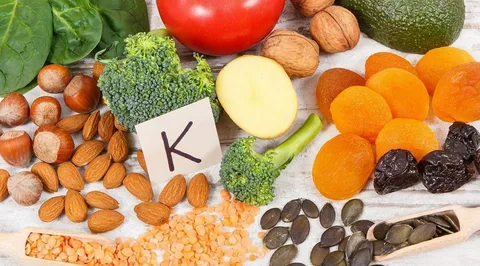How to Get More Vitamin K from Food
Introduction to Vitamin K
Vitamin K is a crucial nutrient known for its role in blood clotting and bone health. There are two main forms: Vitamin K1 (phylloquinone) found in plants and Vitamin K2 (menaquinones) synthesized by bacteria in the gut and found in animal products.
Importance of Vitamin K
Why is Vitamin K important for health?
Vitamin K plays a vital role in:
- Blood Clotting: Essential for the synthesis of clotting factors.
- Bone Health: Helps in bone mineralization and reducing fracture risk.
- Heart Health: May contribute to cardiovascular health by reducing arterial calcification.
Sources of Vitamin K
Natural Food Sources
- Vitamin K1 Sources: Leafy green vegetables (spinach, kale, broccoli), cruciferous vegetables (cabbage, Brussels sprouts), herbs (parsley, basil).
- Vitamin K2 Sources: Fermented foods (natto, cheese), animal liver, meat, eggs.
Recommended Daily Intake
The Adequate Intake (AI) for Vitamin K varies by age and gender:
- Adults: 90-120 micrograms/day for women and men, respectively.
- Higher AI during pregnancy and lactation.
Maximizing Your Vitamin K Intake
Tips for Increasing Vitamin K Consumption
- Include Leafy Greens: Incorporate spinach, kale, and Swiss chard into salads, smoothies, or cooked dishes.
- Add Cruciferous Vegetables: Enjoy broccoli, Brussels sprouts, and cabbage in stir-fries or roasted dishes.
- Choose Fermented Foods: Incorporate natto, a Japanese fermented soybean dish, or fermented cheeses into your diet.
- Include Animal Products: Consume eggs, liver, and meat from pasture-raised or grass-fed animals.
- Use Herbs: Flavor meals with parsley, basil, cilantro, or thyme to boost Vitamin K content.
FAQs About Getting More Vitamin K from Food
What are the symptoms of Vitamin K deficiency?
Vitamin K deficiency may lead to excessive bleeding, easy bruising, and potentially osteoporosis over time.
Can you get enough Vitamin K from diet alone?
Yes, a balanced diet rich in Vitamin K1 and K2 sources can typically meet daily requirements.
Are there any interactions between Vitamin K and medications?
Vitamin K can interact with blood-thinning medications like warfarin, so consult a healthcare provider if you’re on such medications.
How can vegetarians and vegans get enough Vitamin K?
Vegetarians can rely on leafy greens and fermented foods. Vegans may need to consider Vitamin K2 supplements derived from fermented sources like natto or certain algae.
What cooking methods preserve Vitamin K content?
Steaming and sautéing lightly can help retain Vitamin K in vegetables. Avoid overcooking, as Vitamin K is sensitive to heat.
Are there risks associated with excessive Vitamin K intake?
Vitamin K toxicity is rare from dietary sources but can occur with high-dose supplements, potentially affecting clotting times.
Does Vitamin K play a role in skin health?
Emerging research suggests Vitamin K may aid in skin elasticity and wound healing, though more studies are needed.
Should I be concerned about Vitamin K levels as I age?
Aging may affect Vitamin K absorption, so ensuring adequate intake from diverse sources becomes increasingly important.
Can Vitamin K deficiency affect cardiovascular health?
Low Vitamin K intake has been linked to increased risk of arterial calcification, potentially impacting heart health.
How can I ensure my child gets enough Vitamin K?
Including age-appropriate sources like fortified cereals, leafy greens in purees, and Vitamin K-rich snacks can help support children’s nutritional needs.
Conclusion
Ensuring sufficient Vitamin K intake through a balanced diet of leafy greens, fermented foods, and appropriate animal products supports overall health and vitality. By understanding its sources, benefits, and potential interactions, you can optimize your diet to meet daily Vitamin K needs effectively.
- Nu-Derm Skin System Near Wisley, Surrey - May 31, 2025
- What Does Skoliosexuality Mean In Today’s Dating World? - May 31, 2025
- Neck Line Filler Treatment Near Staines, Surrey - May 30, 2025


